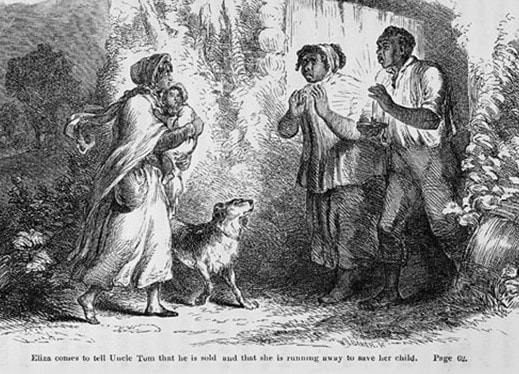Uncle Tom's Cabin
Shortly after leaving Cincinnati, Harriet Beecher Stowe authored the best-selling book of its time, Uncle Tom's Cabin. The novel is a fictionalized account of the pain slavery caused its victims, the struggles slaves endured to escape and travel on the Underground Railroad, and the triumph of escaping to freedom in the northern states or Canada. Within the first year of publication, Uncle Tom’s Cabin sold 300,000 copies. Additionally, Uncle Tom's Cabin has now been published in over 75 languages and is still an important text used in schools all over the world.
What caused Harriet to write Uncle Tom's Cabin?
In 1849, Harriet and her family experienced the devastating effects of cholera; Harriet and Calvin's 6th child, Samuel Charles, was a victim of the cholera epidemic. Harriet was completely distraught at having lost her son. Since medical intervention at the time was sparse, Harriet simply had to watch as cholera took over her son's body and his life. In a letter to Calvin, Harriet wrote that losing Charles made her understand what slave women felt when their children were taken from them at the auction block.
Shortly after, in 1850, Congress passed the Fugitive State Law which required citizens to help police officers catch runaway slaves. Harriet believed the law to be unchristian, and she used this viewpoint to encourage families to honor their religious faith and help those in need.
This book was written at a time when women did not have a right to vote, have legal rights, or the right to speak in public meetings. Uncle Tom's Cabin became an important part of the social fabric and it is thought to have added wood to the fire that started the Civil War and led to the emancipation of southern slaves by President Abraham Lincoln in 1863.
What caused Harriet to write Uncle Tom's Cabin?
In 1849, Harriet and her family experienced the devastating effects of cholera; Harriet and Calvin's 6th child, Samuel Charles, was a victim of the cholera epidemic. Harriet was completely distraught at having lost her son. Since medical intervention at the time was sparse, Harriet simply had to watch as cholera took over her son's body and his life. In a letter to Calvin, Harriet wrote that losing Charles made her understand what slave women felt when their children were taken from them at the auction block.
Shortly after, in 1850, Congress passed the Fugitive State Law which required citizens to help police officers catch runaway slaves. Harriet believed the law to be unchristian, and she used this viewpoint to encourage families to honor their religious faith and help those in need.
This book was written at a time when women did not have a right to vote, have legal rights, or the right to speak in public meetings. Uncle Tom's Cabin became an important part of the social fabric and it is thought to have added wood to the fire that started the Civil War and led to the emancipation of southern slaves by President Abraham Lincoln in 1863.
|
Web Hosting by iPage

